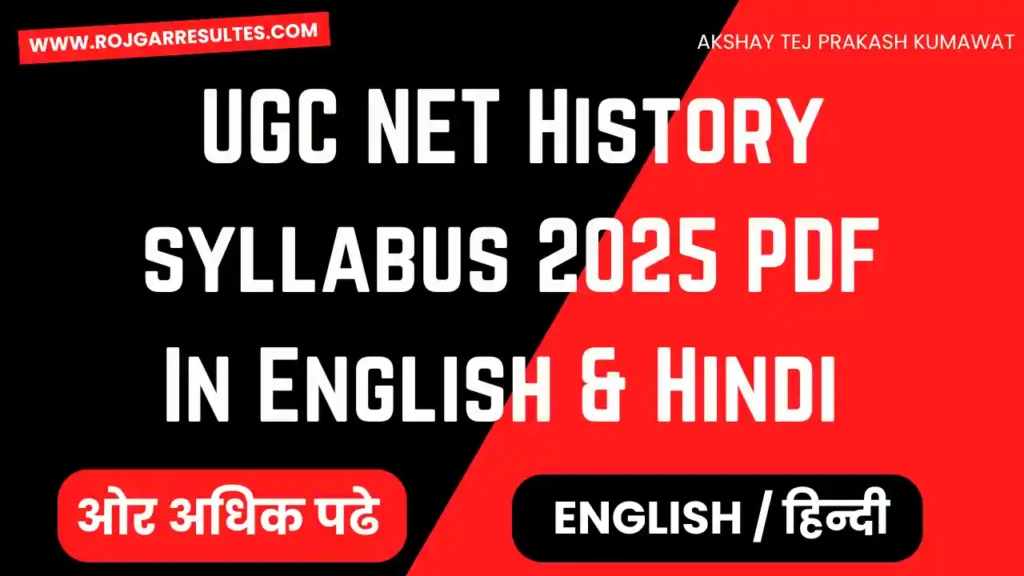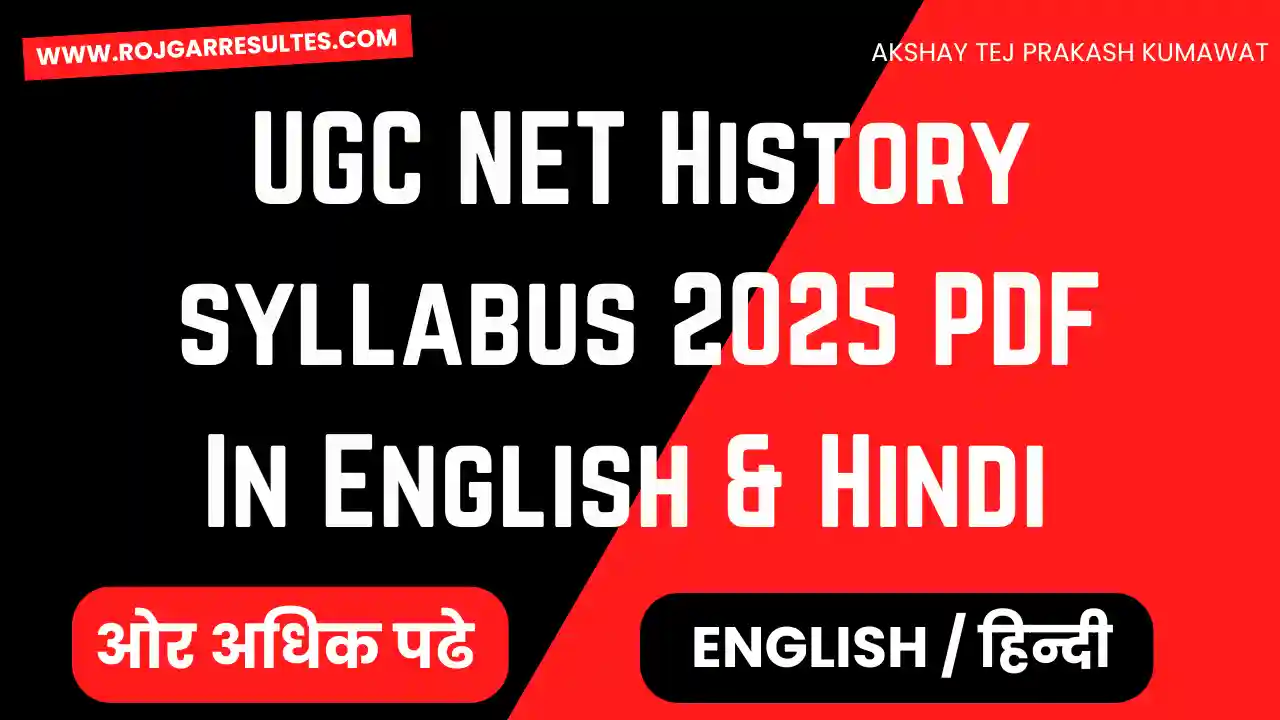UGC NET History syllabus is designed to test the in-depth knowledge and conceptual understanding of candidates aspiring for lectureship and research positions in History. Conducted by the University Grants Commission (UGC) and National Testing Agency (NTA), this exam assesses understanding across Ancient, Medieval, and Modern Indian History, along with World History, Historical Methods, and Historiography.
सभी अभ्यर्थियों को सूचित किया जाता है कि रिजल्ट, सिलेबस, आवेदन लिंक, एडमिट कार्ड व नोटिफिकेशन के सभी लिंक नीचे उपलब्ध हैं।
This blog provides a unit-wise detailed explanation of the latest UGC NET History Syllabus, key topics, and essential terms for effective preparation.
UGC NET History Exam Pattern (Quick Glance)
| Paper | Subject | Marks | No. of Questions | Duration |
|---|---|---|---|---|
| Paper I | General Aptitude | 100 | 50 | 3 Hours (Combined) |
| Paper II | History | 200 | 100 | 3 Hours (Combined) |
Overview of UGC NET History Syllabus
The History syllabus includes ten comprehensive units covering all periods of Indian history, along with historiographical trends and research methodology.
Major Themes Covered:
- Prehistoric to Modern Indian History
- Indian National Movement and Post-Independence Era
- Historical Research Methods and Historiography
I – Sources and Early Societies
Key Focus: Archaeological and Literary sources, early civilizations, and socio-political systems.
Main Topics:
- Archaeological Sources: Exploration, Excavation, Epigraphy, Numismatics
- Literary Sources: Vedic texts, Buddhist and Jain literature, foreign accounts (Greek, Chinese, Arabic)
- Neolithic and Chalcolithic cultures: Settlements, food production, and exchange networks
- Indus Valley Civilization: Sites, society, polity, religion, trade, and decline
- Mahajanapadas and Second Urbanization
- Rise of Jainism, Buddhism, and Ajivikas
II – State Formation and Empire Building
Key Focus: Evolution from regional states to empires and cultural development.
Main Topics:
- Rise of Magadha and Mauryan Empire
- Asoka’s Dhamma and Mauryan administration
- Indo-Greek, Sunga, Satavahana, Kushana and Saka rulers
- Trade with the Roman world, Mahayana Buddhism
- Gupta–Vakataka Age: Economy, polity, Sanskrit literature, and temple architecture
- Science, Mathematics, and Medicine in Gupta era
- Post-Gupta period and regional states
III – Early Medieval India (600–1200 CE)
Key Focus: Regional states, economy, society, and religion.
Main Topics:
- Deccan & South Indian Kingdoms: Pallavas, Cholas, Pandyas, Rashtrakutas, Kakatiyas, Hoysalas
- Eastern and Western Indian Kingdoms: Palas, Senas, Maitrakas, Gurjara-Pratiharas, Paramaras
- Agrarian economy, trade, guilds, and urbanization
- Temple architecture and Bhakti movement
- Growth of Saivism, Vaishnavism, education centers, and regional languages
- Models of state formation: Feudal, Segmentary, and Integrative
- Arab contacts and Alberuni’s accounts
IV – Medieval India (1200–1750 CE)
Key Focus: Political developments, empires, and regional powers.
Main Topics:
- Delhi Sultanate: Ghorids to Lodis – administration, decline
- Mughal Empire: Babur to Aurangzeb – expansion, consolidation, decline
- Vijayanagara and Bahmani Kingdoms
- Maratha Empire: Rise under Shivaji, Peshwas, and decline
- Regional polities in Deccan and Eastern India
V – Medieval Administration and Economy
Key Focus: Administrative systems and economic structures.
Main Topics:
- Central and provincial administration under Sultanate and Mughals
- Mansabdari, Jagirdari, and Sher Shah’s reforms
- Vijayanagara and Bahmani administrative structures
- Agrarian economy, peasantry, irrigation, and taxation
- Trade, commerce, European interaction, ports, and transport
- Hundi, insurance, and currency systems
- Famines and peasant uprisings
VI – Society and Culture in Medieval India
Key Focus: Religious movements, social structure, and cultural synthesis.
Main Topics:
- Bhakti and Sufi movements – key saints and teachings
- Caste system, position of women, rural society
- Development of art, music, painting (Mughal, Rajasthani, Pahari)
- Indo-Islamic architecture, temples, forts, and educational institutions
VII – Colonial Expansion and Resistance
Key Focus: British establishment and early resistance movements.
Main Topics:
- European traders: Portuguese, Dutch, French, British
- British conquest and expansion
- Revolt of 1857 – causes and impact
- British administration – Company to Crown rule
- Paramountcy, judiciary, army, and police
- Constitutional developments (1909–1935)
VIII – Colonial Economy and Society
Key Focus: Economic transformation and social changes under colonial rule.
Main Topics:
- Commercialization of agriculture and land settlements
- Decline of indigenous industries
- Economic drain and rise of modern industries
- Labour, trade unions, and transport development
- Education, science, and health reforms
- Indian Renaissance and socio-religious reform movements
- Women’s rights, education, and legislation
- Modern literature, journalism, and arts
IX – Indian National Movement and Post-Independence India
Key Focus: National struggle and post-1947 transformation.
Main Topics:
- Rise of Indian Nationalism and formation of Indian National Congress
- Swadeshi, Swaraj, Gandhian movements
- Revolutionary, Left-wing, and Women’s movements
- Communal politics and Partition of India
- Post-Independence challenges: integration, constitution, economy
- Reorganization of states, foreign policy, emergency, and liberalization
X – Historical Methodology and Historiography
Key Focus: Nature of historical research and philosophical approaches to history.
Main Topics:
- Objectivity, bias, and causation in history
- Heuristics, criticism, and synthesis
- Research methods, data collection, and hypothesis
- Greek, Roman, Church, and Renaissance historiography
- Von Ranke’s scientific history, Marxist and cyclical theories
- Toynbee’s Challenge-Response model
- Postmodernism and recent trends in Indian historiography
- Thesis writing, referencing, plagiarism ethics


